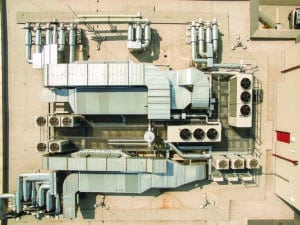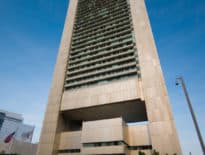
Boston’s BERDO 2.0 rules allow the owners of large buildings to wait and replace things like heating and cooling systems at the end of their natural life cycles.
Boston Mayor Michelle Wu will seek adoption of the state’s new opt-in stretch energy code, requiring electric-ready designs for new buildings and renovations.
If approved by the Boston City Council, projects would have to conform to the new requirements beginning in January.
In an announcement this morning at the Brian J. Honan Apartments in Allston, one of the first recipients of funding, Wu framed the proposal as a key step in her Green New Deal environmental platform.
“We’re taking aim at one of Boston’s biggest culprits when it comes to our carbon footprint,” Wu said of the city’s building stock, which generates nearly 70 percent of greenhouse gas emissions according to city research.
The state’s opt-in stretch energy code requires tightly-sealed building envelopes for new building construction and major renovations, and pre-wiring to allow transition to electric building systems.
Brookline, Cambridge and Watertown already have approved the opt-in code effective July 1.
According to the state Department of Energy Resources, the specialized opt-in energy code is designed to reduce greenhouse gas emissions from 1990 levels by 50 percent by 2050.
Wu also announced a $10 million grant program to owners of affordable housing to replace fossil fuel building systems through deep energy retrofits.
The pilot program, using a portion of the city’s American Rescue Plan Act funds, is considered a pilot for a broader future effort to decarbonize the city’s building stock, officials from the environmental and housing departments said at a press briefing.
The competitive program will allocate up to $50,000 per unit for selected properties that contain at least 15 units and at least half income-restricted units. Deep energy retrofits include replacement of gas-burning stoves and heating systems and upgrades to create tighter, more energy-efficient building envelopes.
Applications are being accepted on a rolling basis by the Mayor’s Office of Housing through a request for proposals released this week.
Last August, Wu announced Boston would seek legislative approval to join the state’s 10-community pilot program completing phasing out the use of fossil fuel systems in building projects. Boston’s request is still under state review, pending DOER’s adoption of final regulations for the municipal fossil fuel free pilot.
Building retrofits are considered one of the most important and costly hurdles in meeting Boston’s goals for decarbonizing its building stock.
A large portion of the city’s housing stock is comprised of small older buildings – such as triple-deckers – that run on inefficient natural gas-fired heating systems.
A report released in November warned that Boston won’t be able to meet its goal of attaining net zero carbon emissions by 2050 without bolder steps to retrofit older buildings.
The Boston Foundation report, written by researchers at Northeastern University’s Dukakis Center for Urban and Regional Policy, calls for retrofits to electrify heating and cooking systems for an estimated 70,000 small residential buildings representing approximately half of Boston’s households.
During 2021, the city issued only 100 permits for installation of heat pumps in residential buildings with up to three housing units. At the same time, gas-fired system replacements were approved for more than 1,000 properties.
And the cost of retrofits remain prohibitive for many households, despite incentives offered by the $1.3 billion MassSave program, according to the Boston Foundation report.
Gov. Maura Healey last year indicated support for creating a statewide Green Bank to act as a climate building project clearinghouse replacing the Mass Save program, but has not announced additional details since taking office.
A 2020 study by The Cadmus Group estimated costs of nearly $33 billion to retrofit commercial and multifamily buildings in 101 Greater Boston communities to meet decarbonization goals on the state and local level.




 |
| 



